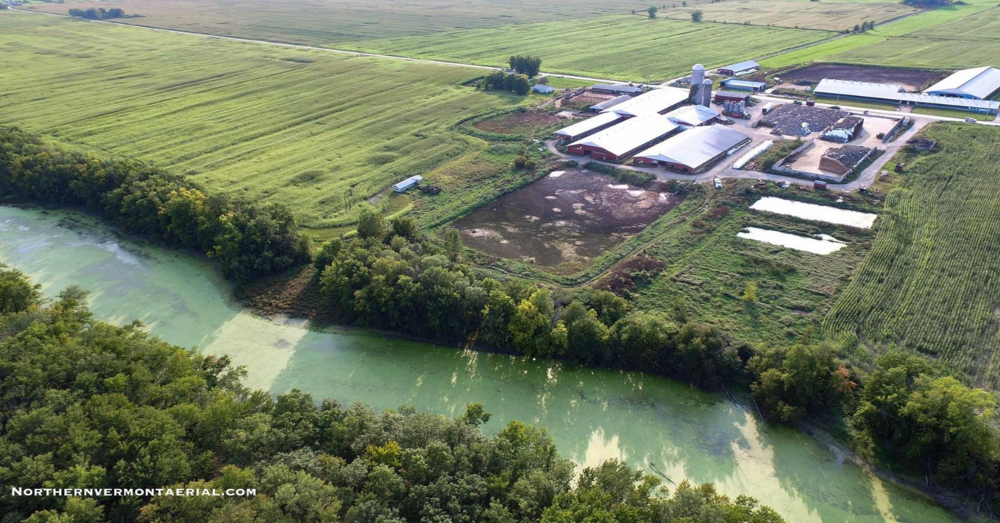
62,458 Pounds of Monsanto Weedkiller. In One Year. In One Small State.
February 6, 2018 | Katherine Paul
Organic Consumers Association
Vermonters are, literally, swimming in a toxic soup of glyphosate (Monsanto’s Roundup weedkiller), atrazine, 2,4-D and other pesticides.
The use of glyphosate alone—just on Vermont dairy farms—jumped 27 percent between 2014 – 2017, according to new data released last month by Vermont’s Agency of Agriculture, Food and Markets.
Reporting on the data, Michael Colby, co-founder of Regeneration Vermont, wrote:
GMO corn is now grown on more than 92,000 acres in Vermont, making it – by far – the state’s number one crop. And all of it is being grown for the state’s 135,000 cows, mostly now confined as the large, mega-dairy model increasingly takes over, seen most dramatically in Franklin and Addison counties, where “farms” are now warehousing thousands of cows.
According to Colby, the “toxic stew” of pesticides polluting Vermont’s waterways includes 34 different products. In 2016, the most heavily used was glyphosate—62,458 pounds. That’s more than double the amount used in 2014.
That’s a lot of Monsanto Roundup weedkiller dumped in a state that ranks 43rd in size. It makes for one “dirty dairy” industry.
And Ben & Jerry’s—owned by the international consumer products conglomerate, Unilever—is one of, if not the biggest player in that industry.
TAKE ACTION: Tell Ben & Jerry’s: Go 100% Organic!
In July, OCA broke the news about Roundup weedkiller contamination in Ben & Jerry’s ice cream in the U.S. and launched our campaign to get Ben & Jerry’s to go organic.
In October, we held a joint press conference in Brussels to announce that samples of Ben & Jerry’s ice cream in four European countries also tested positive for glyphosate. But this time, warned in advance about our plans, Ben & Jerry’s countered with its own announcement—plans to “launch glyphosate-free ice cream.”
What exactly did Ben & Jerry’s promise?
What exactly did Ben & Jerry’s promise in October? Two things.
Ben & Jerry’s said that by 2020 it would aim to eliminate glyphosate-contaminated ingredients from its supply chain—presumably by not sourcing ingredients from suppliers that use glyphosate to dry out crops before harvest.
Two, Ben & Jerry’s said that in the U.S. (not Europe) it would introduce a line of organic ice cream in 2018, amounting to 6 percent of the brand’s total ice cream production in the U.S.
So far, we’ve heard no further news on either promise. But this we do know—even if the ice cream maker makes good on those promises, Vermont’s dairy farmers will still be feeding their cows GMO corn, and still polluting the state’s waterways.
And it’s not just Vermont—Ben & Jerry’s sources dairy in western states, too—all from non-organic industrial dairy farms.
Why are we picking on Ben & Jerry’s?
We’ve heard from a lot of you that Ben & Jerry’s isn’t the worst company out there, and after all, the company does so many “good” things.
Maybe true. But Ben & Jerry’s has no rival when it comes to creating the false impression that the company cares deeply about the environment and social responsibility.
There’s nothing environmentally friendly or socially responsible about dumping 62,459 pounds of glyphosate into Vermont’s waterways and soil.
Ben & Jerry’s knows this. The company also knows that 73 percent of consumers seek out products associated with the word “natural.” And 55 percent of consumers are willing to pay a premium for companies they believe are “socially responsible.”
Ben & Jerry’s became a top-selling brand in the $78-billion ice cream industry because by creating the phony impression that the company cares about the same things you do.
This same top-selling brand—which generates massive profits for Unilever at the expense of people in Vermont and other states—could turn the dairy industry around by announcing a 100-percent transition to organic.
If only.
Campaign update: Where are we now?
We continue to pressure Ben & Jerry’s to live up to its promises of social and environmental responsibility.
Six other organizations joined us in gathering over 200k signatures petitioning Ben & Jerry’s to go organic.
About 150 businesses and NGOs have signed this letter to Ben & Jerry’s.
Many of you have asked your natural food store or co-op to stop selling Ben & Jerry’s. Some of you have reported back that you were successful—your store agreed to #DumpBenandJerrys!
And many of you have signed our petition asking National Co-Op Grocers to stop pushing Ben & Jerry’s.
If you haven’t yet joined in the Ben & Jerry’s campaign, or you want to do more, here’s a list of actions you can take:
• Sign the petition to Ben & Jerry’s
• Sign the petition to National Co-Op Grocers
• Check this list to see if your natural food store or co-op sells Ben & Jerry’s. If it does, send this letter to the store manager.
• Let us know what you learn about your local store
• Download this flyer and hand it out in front of your local Ben & Jerry’s retailer
• Download this glyphosate fact sheet and share it widely
• Make a tax-deductible donation to support our campaign asking Ben & Jerry’s to go organic.
Companies that market themselves as “green” and socially responsible ought to be held accountable for profiting from those marketing claims. And when those companies are as big as Ben & Jerry’s, they ought to use their profits and power to actually make the world a better place—instead of just talking about it.
Katherine Paul is associate director of the Organic Consumers Association. To keep up with OCA’s news and alerts, sign up here.
